非谓语动词讲解及试
- 格式:docx
- 大小:24.26 KB
- 文档页数:10
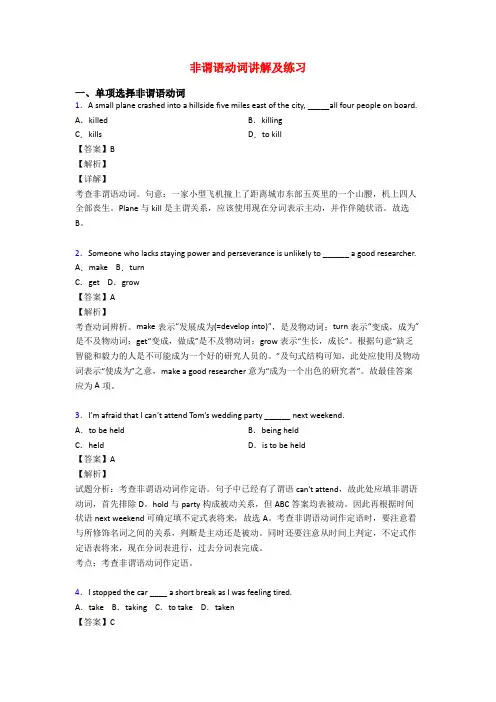
非谓语动词讲解及练习一、单项选择非谓语动词1.A small plane crashed into a hillside five miles east of the city, _____all four people on board. A.killed B.killingC.kills D.to kill【答案】B【解析】【详解】考查非谓语动词。
句意:一家小型飞机撞上了距离城市东部五英里的一个山腰,机上四人全部丧生。
Plane与kill是主谓关系,应该使用现在分词表示主动,并作伴随状语。
故选B。
2.Someone who lacks staying power and perseverance is unlikely to ______ a good researcher. A.make B.turnC.get D.grow【答案】A【解析】考查动词辨析。
make表示“发展成为(=develop into)”,是及物动词;turn表示“变成,成为”是不及物动词;get“变成,做成”是不及物动词;grow表示“生长,成长”。
根据句意“缺乏智能和毅力的人是不可能成为一个好的研究人员的。
”及句式结构可知,此处应使用及物动词表示“使成为”之意,make a good researcher 意为“成为一个出色的研究者”。
故最佳答案应为A项。
3.I’m afraid that I can’t attend Tom’s wedding party ______ next weekend.A.to be held B.being heldC.held D.is to be held【答案】A【解析】试题分析:考查非谓语动词作定语。
句子中已经有了谓语can't attend,故此处应填非谓语动词,首先排除D。
hold与party构成被动关系,但ABC答案均表被动。
因此再根据时间状语next weekend可确定填不定式表将来,故选A。

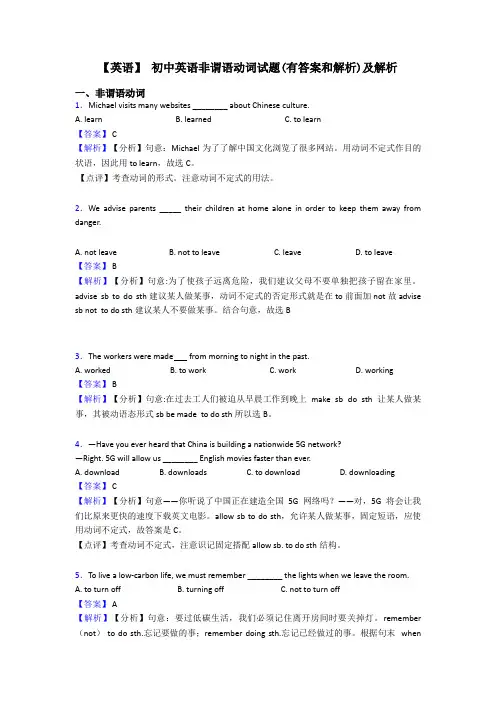
【英语】初中英语非谓语动词试题(有答案和解析)及解析一、非谓语动词1.Michael visits many websites ________ about Chinese culture.A. learnB. learnedC. to learn【答案】 C【解析】【分析】句意:Michael为了了解中国文化浏览了很多网站。
用动词不定式作目的状语,因此用to learn,故选C。
【点评】考查动词的形式。
注意动词不定式的用法。
2.We advise parents _____ their children at home alone in order to keep them away from danger.A. not leaveB. not to leaveC. leaveD. to leave【答案】 B【解析】【分析】句意:为了使孩子远离危险,我们建议父母不要单独把孩子留在家里。
advise sb to do sth建议某人做某事,动词不定式的否定形式就是在to前面加not故advise sb not to do sth建议某人不要做某事。
结合句意,故选B3.The workers were made from morning to night in the past.A. workedB. to workC. workD. working【答案】 B【解析】【分析】句意:在过去工人们被迫从早晨工作到晚上make sb do sth让某人做某事,其被动语态形式sb be made to do sth所以选B。
4.—Have you ever heard that China is building a nationwide 5G network?—Right. 5G will allow us ________ English movies faster than ever.A. downloadB. downloadsC. to downloadD. downloading【答案】 C【解析】【分析】句意——你听说了中国正在建造全国5G网络吗?——对,5G将会让我们比原来更快的速度下载英文电影。
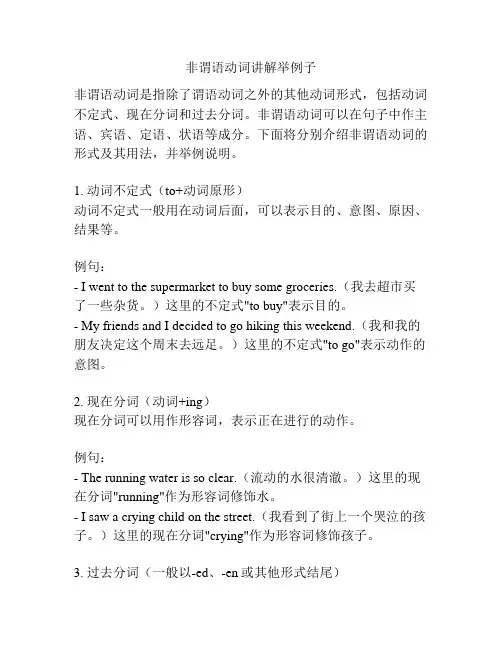
非谓语动词讲解举例子非谓语动词是指除了谓语动词之外的其他动词形式,包括动词不定式、现在分词和过去分词。
非谓语动词可以在句子中作主语、宾语、定语、状语等成分。
下面将分别介绍非谓语动词的形式及其用法,并举例说明。
1. 动词不定式(to+动词原形)动词不定式一般用在动词后面,可以表示目的、意图、原因、结果等。
例句:- I went to the supermarket to buy some groceries.(我去超市买了一些杂货。
)这里的不定式"to buy"表示目的。
- My friends and I decided to go hiking this weekend.(我和我的朋友决定这个周末去远足。
)这里的不定式"to go"表示动作的意图。
2. 现在分词(动词+ing)现在分词可以用作形容词,表示正在进行的动作。
例句:- The running water is so clear.(流动的水很清澈。
)这里的现在分词"running"作为形容词修饰水。
- I saw a crying child on the street.(我看到了街上一个哭泣的孩子。
)这里的现在分词"crying"作为形容词修饰孩子。
3. 过去分词(一般以-ed、-en或其他形式结尾)过去分词一般用作形容词,表示被动或完成的动作。
例句:- The broken window needs to be repaired.(破损的窗户需要修理。
)这里的过去分词"broken"作为形容词修饰窗户。
- She was thrilled to receive the unexpected gift.(她收到这个意外的礼物感到兴奋。
)这里的过去分词"unexpected"作为形容词修饰礼物。
非谓语动词还有其他用法,如作状语、宾语补足语等,下面是一些例子:- Being a doctor, he is always busy.(作状语)作为一个医生,他总是很忙。
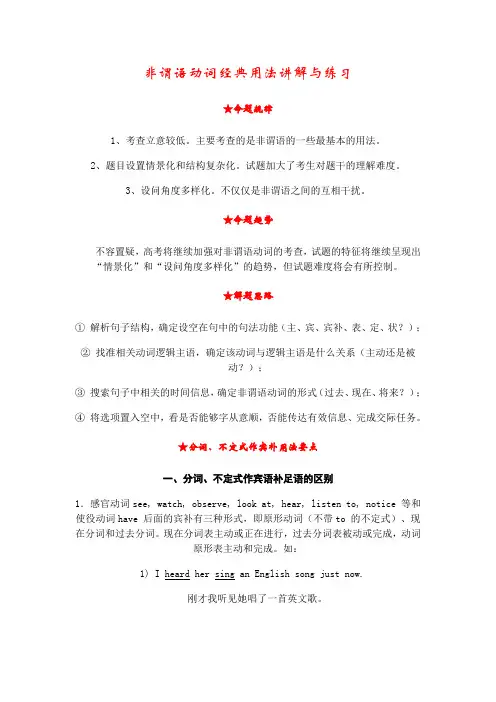
非谓语动词经典用法讲解与练习★命题规律1、考查立意较低。
主要考查的是非谓语的一些最基本的用法。
2、题目设置情景化和结构复杂化。
试题加大了考生对题干的理解难度。
3、设问角度多样化。
不仅仅是非谓语之间的互相干扰。
★命题趋势不容置疑,高考将继续加强对非谓语动词的考查,试题的特征将继续呈现出“情景化”和“设问角度多样化”的趋势,但试题难度将会有所控制。
★解题思路① 解析句子结构,确定设空在句中的句法功能(主、宾、宾补、表、定、状?);② 找准相关动词逻辑主语,确定该动词与逻辑主语是什么关系(主动还是被动?);③ 搜索句子中相关的时间信息,确定非谓语动词的形式(过去、现在、将来?);④ 将选项置入空中,看是否能够字从意顺,否能传达有效信息、完成交际任务。
★分词、不定式作宾补用法要点一、分词、不定式作宾语补足语的区别1.感官动词see, watch, observe, look at, hear, listen to, notice 等和使役动词have 后面的宾补有三种形式,即原形动词(不带to 的不定式)、现在分词和过去分词。
现在分词表主动或正在进行,过去分词表被动或完成,动词原形表主动和完成。
如:1)Tom had his leg broken while playing football.2)Mr. Smith had his house broken into while he was away on holiday.二、下列动词后跟带to 的不定式作宾补:【口诀】讨厌命令作宾补说服警告想希望,导致逼迫禁期望。
建议允许求鼓励,要教邀请更喜欢。
1)hate, order2)persuade, warn, tell, order, want, wish,3)cause, force, forbid, expect,4)advise, allow, permit, ask, beg, encourage,5)get, require, teach, invite, prefer, like, love,① An army spokesman stressed that all the soldiers had been ordered toissue clear warning before firing any shots.② The teacher asked us not to make so much noise.③ The flu is believed to be caused by viruses that like to re produce inthe cells inside the human nose and throat.三、不定式、现在分词作宾补小窍门1、下列动词后在主动语态中用不带to 不定式作补语,但在被动语态中要加to:它们是“吾看三室两厅一感觉” 5看(look at, see, watch, notice, observe);3使(make, let, have);2听(listen to, hear);1感觉(feel)。
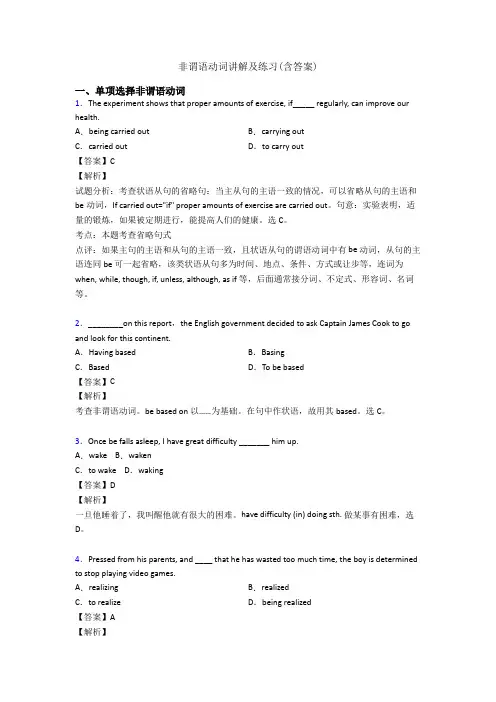
非谓语动词讲解及练习(含答案)一、单项选择非谓语动词1.The experiment shows that proper amounts of exercise, if_____ regularly, can improve our health.A.being carried out B.carrying outC.carried out D.to carry out【答案】C【解析】试题分析:考查状语从句的省略句:当主从句的主语一致的情况,可以省略从句的主语和be动词,If carried out="if" proper amounts of exercise are carried out。
句意:实验表明,适量的锻炼,如果被定期进行,能提高人们的健康。
选C。
考点:本题考查省略句式点评:如果主句的主语和从句的主语一致,且状语从句的谓语动词中有 be 动词,从句的主语连同be 可一起省略,该类状语从句多为时间、地点、条件、方式或让步等,连词为when, while, though, if, unless, although, as if 等,后面通常接分词、不定式、形容词、名词等。
2.________on this report,the English government decided to ask Captain James Cook to go and look for this continent.A.Having based B.BasingC.Based D.To be based【答案】C【解析】考查非谓语动词。
be based on以……为基础。
在句中作状语,故用其based。
选C。
3.Once be falls asleep, I have great difficulty _______ him up.A.wake B.wakenC.to wake D.waking【答案】D【解析】一旦他睡着了,我叫醒他就有很大的困难。
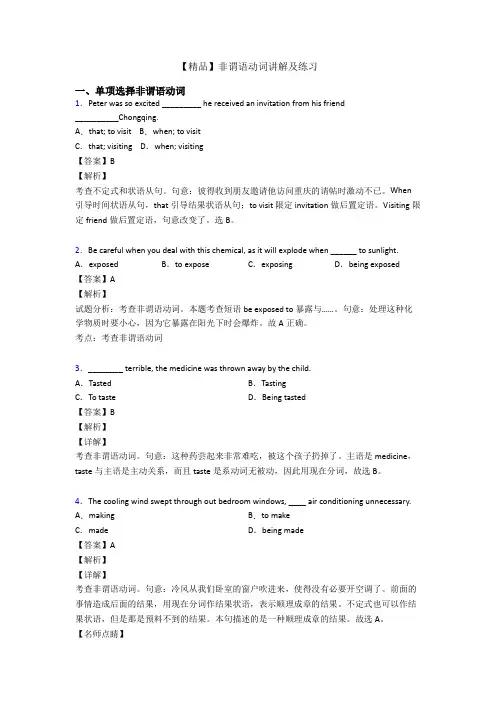
【精品】非谓语动词讲解及练习一、单项选择非谓语动词1.Peter was so excited _________ he received an invitation from his friend__________Chongqing.A.that; to visit B.when; to visitC.that; visiting D.when; visiting【答案】B【解析】考查不定式和状语从句。
句意:彼得收到朋友邀请他访问重庆的请帖时激动不已。
When 引导时间状语从句,that引导结果状语从句;to visit 限定invitation做后置定语。
Visiting限定friend做后置定语,句意改变了。
选B。
2.Be careful when you deal with this chemical, as it will explode when ______ to sunlight. A.exposed B.to expose C.exposing D.being exposed【答案】A【解析】试题分析:考查非谓语动词。
本题考查短语be exposed to暴露与……。
句意:处理这种化学物质时要小心,因为它暴露在阳光下时会爆炸。
故A正确。
考点:考查非谓语动词3.________ terrible, the medicine was thrown away by the child.A.Tasted B.TastingC.To taste D.Being tasted【答案】B【解析】【详解】考查非谓语动词。
句意:这种药尝起来非常难吃,被这个孩子扔掉了。
主语是medicine,taste与主语是主动关系,而且taste是系动词无被动,因此用现在分词,故选B。
4.The cooling wind swept through out bedroom windows, ____ air conditioning unnecessary. A.making B.to makeC.made D.being made【答案】A【解析】【详解】考查非谓语动词。

高考必备英语非谓语动词技巧全解及练习题(含答案)一、单项选择非谓语动词1.(重庆) Like ancient sailors, birds can find their way__________ the sun and the stars. A.used B.having usedC.using D.use【答案】C【解析】【分析】【详解】考查非谓语动词。
句意:象古代的水手,鸟能利用太阳和星辰来找到他们的路。
谓语动词是can find,故use用非谓动词作伴随状语,与逻辑主语birds是主动关系,用现在分词做伴随状语,根据句意,use这一动作与谓语动词动作同时,用现在分词的一般式。
故选C。
【点睛】伴随状语是指状语从句的动作伴随主句发生,它的特点是:它所表达的动作或状态是伴随着句子谓语动词的动作而发生或存在的,这个考点在高考中经常出现,本题考查的是分词做伴随状语,分为现在分词和过去分词,现在分词短语表示与主句的主语在逻辑上有主谓关系,即表示主动意义;而过去分词短语则表示与主句的主语在逻辑上是动宾关系,即被动意义;He sen me an e-mail hoping to ge further information 他给我发一封电子邮件,希望得到更多的信息; He hurried to the hall, followed by two guards. 他匆忙进了大厅,后面跟着两个警卫。
2.127.Everything ______ into due consideration, she eventually decided to further her education at home.A.having taken B.to be taken C.being taken D.taken【答案】D【解析】考查过去分词的独立主格结构。
句意:考虑到一切,她最终决定继续在家接受教育。
因为本题逗号前后没有连词,所以逗号前面不能是句子。
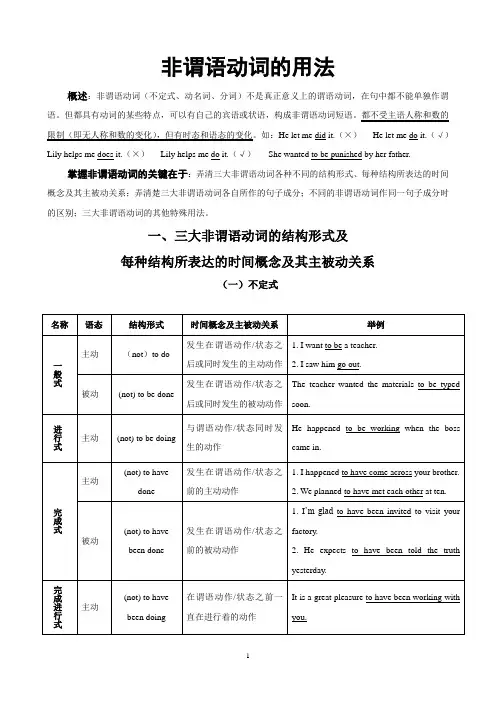
非谓语动词的用法概述:非谓语动词(不定式、动名词、分词)不是真正意义上的谓语动词,在句中都不能单独作谓语。
但都具有动词的某些特点,可以有自己的宾语或状语,构成非谓语动词短语。
都不受主语人称和数的限制(即无人称和数的变化),但有时态和语态的变化。
如:He let me did it.(×)----He let me do it.(√)Lily helps me does it.(×)----Lily helps me do it.(√)She wanted to be punished by her father.掌握非谓语动词的关键在于:弄清三大非谓语动词各种不同的结构形式、每种结构所表达的时间概念及其主被动关系;弄清楚三大非谓语动词各自所作的句子成分;不同的非谓语动词作同一句子成分时的区别;三大非谓语动词的其他特殊用法。
一、三大非谓语动词的结构形式及每种结构所表达的时间概念及其主被动关系(一)不定式(二)动名词(三)分词二、三大非谓语动词各自所充当的句子成分非谓语动词具有各自不同的词类特征,因此充当的句子成分也各不相同。
不定式具有名词、动词、形容词和副词的特性,在句中可以作主语、宾语、表语、定语、状语和宾语补足语;动名词具有名词和动词的特性,在句中可以作主语、宾语、表语和定语;分词具有动词、形容词和副词的特性,在句中可以作表语、定语、状语和宾语补足语。
(见下面的图表)。
不定式:主语、宾语、表语、定语、状语、宾补动名词:主语、宾语、表语、定语分词:表语、定语、状语、宾补附:三大非谓语动词的区别一览表注意:当由现在分词和过去分词变化而来的形容词与定冠词连用表示一类人或事物时,可以作主语或宾语。
如:the dying,the wounded等。
三、不同的非谓语动词作同一句子成分时的区别(一)、作主语(不定式和动名词作主语的区别):1. 所表动作的具体含义不同:不定式作主语多表示具体的、一次性的动作;动名词作主语多表示经常性的、习惯性的动作。
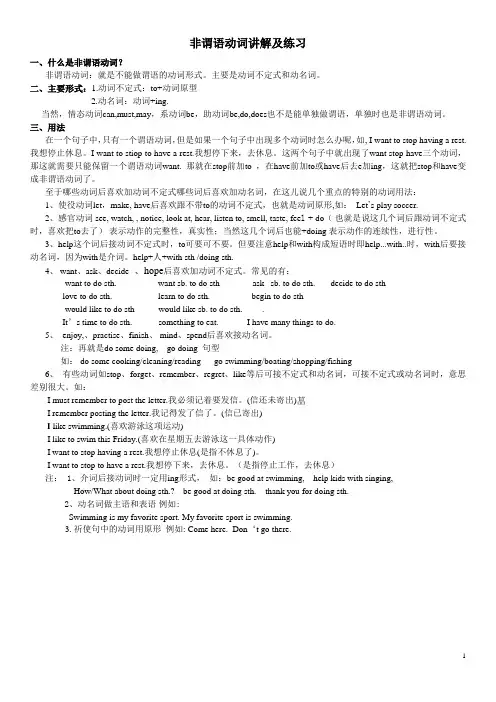
非谓语动词讲解及练习一、什么是非谓语动词?非谓语动词:就是不能做谓语的动词形式。
主要是动词不定式和动名词。
二、主要形式:1.动词不定式:to+动词原型2.动名词:动词+ing.当然,情态动词can,must,may,系动词be,助动词be,do,does也不是能单独做谓语,单独时也是非谓语动词。
三、用法在一个句子中,只有一个谓语动词,但是如果一个句子中出现多个动词时怎么办呢,如, I want to stop having a rest.我想停止休息。
I want to stiop to have a rest.我想停下来,去休息。
这两个句子中就出现了want stop have三个动词,那这就需要只能保留一个谓语动词want. 那就在stop前加to ,在have前加to或have后去e加ing,这就把stop和have变成非谓语动词了。
至于哪些动词后喜欢加动词不定式哪些词后喜欢加动名词,在这儿说几个重点的特别的动词用法:1、使役动词let,make, have后喜欢跟不带to的动词不定式,也就是动词原形,如:Let’s play soccer.2、感官动词 see, watch, , notice, look at, hear, listen to, smell, taste, fee l + do(也就是说这几个词后跟动词不定式时,喜欢把to去了)表示动作的完整性,真实性;当然这几个词后也能+doing 表示动作的连续性,进行性。
3、help这个词后接动词不定式时,to可要可不要。
但要注意help和with构成短语时即help...with..时,with后要接动名词,因为with是介词。
help+人+with sth /doing sth.4、want、ask、decide、hope后喜欢加动词不定式。
常见的有:want to do sth. want sb. to do sth ask sb. to do sth. decide to do sthlove to do sth. learn to do sth. begin to do sthwould like to do sth would like sb. to do sth. .It’s time to do sth. something to eat. I have many things to do.5、enjoy,、practise、finish、 mind、spend后喜欢接动名词。
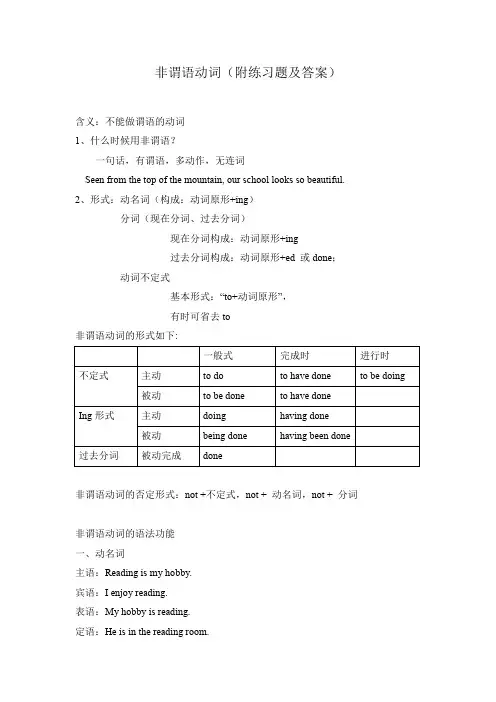
非谓语动词(附练习题及答案)含义:不能做谓语的动词1、什么时候用非谓语?一句话,有谓语,多动作,无连词Seen from the top of the mountain, our school looks so beautiful. 2、形式:动名词(构成:动词原形+ing)分词(现在分词、过去分词)现在分词构成:动词原形+ing过去分词构成:动词原形+ed 或done;动词不定式基本形式:“to+动词原形”,有时可省去to非谓语动词的形式如下:非谓语动词的否定形式:not +不定式,not + 动名词,not + 分词非谓语动词的语法功能一、动名词主语:Reading is my hobby.宾语:I enjoy reading.表语:My hobby is reading.定语:He is in the reading room.二、现在分词表语:The book is interesting.定语:It's an interesting book.状语:He sat there, reading a newspaper.宾补:I saw him standing there.三、过去分词表语:They were excited at the news.定语:There are a few minutes left.状语:Seen from the hill, our school looks beautiful.宾补:I saw him beaten by Tom.四、不定式主语:To catch the train is impossible.宾语:They need to look at a map.表语:My work is to clean the classroom.定语:I have lots of work to do.状语:I am sorry to trouble you.宾补:He told me to close the door.考点动名词考点一:动名词作宾语的动词1.admit doing sth. 承认做某事2.advise/suggest doing sth. 建议做某事3.allow/permit doing sth. 允许做某事4.appreciate doing sth. 感激做某事5.avoid doing sth. 避免做某事6.consider doing sth. 考虑做某事7.delay/put off doing sth. 推迟做某事8.deny doing sth. 否认做某事9.like(enjoy)/dislike doing sth.喜欢/不喜欢做某事10.escape doing sth. 逃脱做某事11.fancy doing sth. 喜欢做某事12.finish doing sth. 完成做某事13.forbid /prohibit doing sth. 禁止做某事14.forgive doing sth. 原谅做某事15.give up doing sth. 放弃做某事16.imagine doing sth. 想象做某事17.keep doing sth. 保持做某事18.mention doing sth. 提及做某事19.mind doing sth. 介意做某事20.miss doing sth. 错过做某事21.practice doing sth. 练习做某事22.prevent doing sth. 阻止做某事23.report doing sth. 报告做某事24.risk doing sth. 冒险做某事25.stop doing sth. 停止做某事词组:devote to,get down to,be accustomed to confess to have trouble/difficulty (in)doing sth.例题:He enjoys ___ pop music while I prefer classical music.A. listen toB. to listenC. listeningD. listening to补充知识:及物动词:后面必须跟宾语的动词,像buy,reach,give等。
非谓语动词作定语一.不定式作定语1.不定式作定语常用于不定代词或被the first/next/only/last等修饰的名词和其他一些名词、代词之后。
其中,不定式的一般式通常表示的动作,完成式则表示该动作发生在谓语动词所表示的动作。
例如:She is always the first (one) to come and the last to leave.2.如果作定语的不定式与被修饰的名词有动宾关系,在不及物动词后通常要加上适当的介词。
例如:Let's first find a room to live in / to put the things in.We have nothing to worry about. (=There is nothing for us to worry about.)3.不定式作定语修饰一个在逻辑上是其宾语名词时,若在句子中能找到该不定式的逻辑主语, 则该不定式多用主动表被动,否则,用被动式。
(本结构是高考常考点)例如:I have a lot of things to do today. ( I ... do ... things)Have you got anything to say at the meeting? ( you... say ... anything)Here is a letter to be taken to Mr. Li.在there be句型中,有时用主动式或被动式意思不同。
1.2.our 1.分He is a student loved by all the teachers.The building being built will be the third Teaching Building of our school.2.像定语从句一样,分词作定语也有非限制性的,其作用相当于一个非限制性定语从句。
例如:The students, wearing their school uniforms, marched into the playground.The substance, discovered almost by accident,has greatly changed the world.非谓语动词做定语1.Many buildings in the city need repairing, but the one ______first is the library.A. repairedB. being repairedC. repairingD. to be repaired2.I'm calling to enquire about the position ________ in yesterday's China Daily.A. advertisedB. to be advertisedC. advertisingD. having advertised3.After she completes the project, she’ll have ________.A. nothing to worry aboutB. nothing to worryC. nothing to be worried aboutD. nothing worrying about4.His first book ______ next month is based on a true story.A. publishedB. to be publishedC. to publishD. being published5.The rare fish, _____ from the cooking pot, has been returned to the sea.A. savedB. savingC. to be savedD. having saved6. A great number of students ______ said they were forced to practise the piano.A. to questionB. to be questionedC. questionedD. questioning7.They built a house _____.A. of the things to put inB. of the things to be put inC. for the things to put inD. for the things to be put in8.That is the only way we can imagine __ the overuse of water in students'bathrooms.A. reducingB. to reduceC. reducedD. reduce9.There is a great deal of evidence ______that music activities engage different partsof the brain.A. indicateB. indicatingC. to indicateD. to be indicating10.We are invited to a party ______in our club next Friday.A. to be heldB. heldC. being heldD. holding11.The trees ________ in the storm have been moved off the road.A. being blown downB. blown downC. blowing downD. to blow down12.I have a lot of readings _____ before the end of this term.A. completingB. to completeC. completedD. being completed13.With the world changing fast, we have something new ______with all by ourselvesevery day.A. dealB. dealtC. to dealD. dealing14.The next thing he saw was smoke ______ from behind the house.A. roseB. risingC. to riseD. risen15.The government plans to bring in new laws _____ parents to take moreresponsibility for the education of their children.A. forcedB. forcingC. to be forcedD. having forced16.On receiving a phone call from his wife _____ she had a fall, Mr Gordonimmediately rushed home from office.A. saysB. saidC. sayingD. to say17.The players ____ from the whole country are expected to bring us honor in thissummer game .A. selectingB. to selectC. selectedD. having selected18.Simon made a big bamboo box _______ the little sick bird till it could fly.A. keepB. keptC. keepingD. to keep19.Peter received a letter just now ________ his grandma would come to see him soon.A.said B.says C.saying D.to say20.The island, ____ to the mainland by a bridge, is easy to go to.A. joiningB. to joinC. joinedD. having joined21.The rare fish, _____ from the cooking pot, has been returned to the sea.A. savedB. savingC. to be savedD. having saved22.Look over there—there’s a very long, winding path ______ up to the house.A. leadingB. leadsC. ledD. to lead23.Recently a survey _____ prices of the same goods in two different supermarketshas caused heated debate among citizens.A. comparedB. comparingC. comparesD. being compared24.The ability _____an idea is as important as the idea itself.A. expressingB. expressedC. to expressD. to be expressed25.Tsinghua University, ____ in 1911,is home to a great number of outstandingfigures.A. foundB. foundingC. foundedD. to be founded26.We’re having a meeting in half an hour. The decision ______at the meeting willinfluence the future of our company.A. to be madeB. being madeC. madeD. having been made27.After completing and signing it, please return the form to us in the envelope _____.A. providingB. providedC. having providedD. provide28.Time, ______ correctly, is money in the bank.A. to useB. usedC. usingD. use29.The lecture, _____ at 7:00 pm last night, was followed by an observation of themoon with telescopes.A. startingB. being startingC. to startD. to be started30.John has really got the job because he showed me the official letter _____ him it.A. offeredB. offeringC. to offerD. to be offered31.“It’s such a nice place,” Mother said as she s at at the table _____ for customers.A. to be reservedB. having reservedC. reservingD. reserved32. Now that we’ve discussed our problem, are people happy with the decisions __ ?A. takingB. takeC. taken D .to take33.The traffic rule says young children under the age of four and ____ less than 40 pounds must be in a child safety seat.A. being weighedB. to weighC. weighedD. weighing34. So far nobody has claimed the money ____ in the library.A. discoveredB. to be discoveredC. discoveringD. having discovered35. Mrs.White showed her students some old maps ______ from the library.A. to borrowB. to be borrowedC. borrowedD. borrowing答案1-5 DAABA 6-10 CDBBA 11-15 BBCBB 16-20 CCDCC21-25 AABCC 26-30 ABBAB 31-35 DCDAC。
高中英语语法非谓语动词讲解及其练习题The document was prepared on January 2, 2021高中英语语法非谓语动词讲解及其练习题非谓语动词是一个较难学的,今天我给大家总结一下非谓语动词的使用和练习,希望大家能把非谓语动词学会非谓语动词是在句子中充当除谓语以外的句子成分的动词形式是动词的非谓语形式.动词一般在句子中充当谓语.在句中可起名词,形容词,副词的作用,在句中充当主语,宾语,表语,补语,定语或状语.即动词的非谓语形式除了不能独立作谓语外,可以承担句子的任何成分3种形式:不定式,分词现在分词、过去分词,动名词1.非谓语动词与谓语动词的相同点有:1如果是及物动词都可与宾语连用,例如:They built a garden.They suggested building a garden.2都可以被状语修饰:The suit fits him very well.The suit used to fit him very well.3都有主动与被动, “体”式一般式;进行式;完成式的变化.例如:He was punished by his parents.谓语动词被动语态He avoided being punished by his parents.动名词的被动式We have written the composition.谓语动词的完成时Having written the composition, we handed it in.现在分词的完成式4都可以有逻辑主语They started the work at once.谓语动词的逻辑主语The boss ordered them to start the work.动词不定式的逻辑主语We are League members.谓语动词的主语We being League member, the work was well done.现在分词的逻辑主语2、非谓语动词与谓语动词的不同点有:1非谓语动词可以有名词作用如动词不定式和动名词,在句中做主语、宾语、表语.2非谓语动词可以有形容词作用如动词不定式和分词,在句中做定语、表语或宾语补足语.3非谓语动词可以有副词作用如动词不定式和分词,在句中作状语.4谓语动词在句中作谓语,受主语的人称和数的限制;非谓语动词在句中不能单独作谓语,它不受主语的人称和数的限制.二非谓语动词的句法功能:二、非谓语动词用法:一动词不定式:to+do,具有名词、形容词、副词的特征.1.不定式的形式:以动词write为例否定式:not + to do1一般式:不定式的一般式所表示的动作与谓语动词动作同时发生或发生在谓语动词动作之后,例如:I'm glad to meet you.He seems to know a lot.We plan to pay a visit.He wants to be an artist.The patient asked to be operated on at once.The teacher ordered the work to be done.2进行式:不定式的进行式所表示的动作与谓语动词动作同时发生,例如:The boy pretended to be working hard.He seems to be reading in his room.3完成式:不定式的完成式表示的动作发生在谓语动词动作之前,例如:I regretted to have told a lie.I happened to have seen the film.He is pleased to have met his friend.2.不定式的句法功能:1作主语:To finish the work in ten minutes is very hard.To lose your heart means failure.动词不定式短语作主语时,常用it作形式主语,真正的主语不定式置于句后,例如上面两句可用如下形式:It is very hard to finish the work in ten minutes.It means failure to lose your heart.常用句式有:1、It+be+名词+to do.2、It takes sb.+some time+to do.3、It+be+形容词+of sb +to do.4、It+be+形容词+for sb.+to do.常用careless,,clever,good,foolish,honest,kind,lazy,nice,right,silly,stupid,wise,等表示赞扬或批评的形容词,不定式前的sb.可作其逻辑主语.2作表语:Her job is to clean the hall.He appears to have caught a cold.3作宾语:常与不定式做宾语连用的动词有:want, hope, wish, offer, fail, plan, learn, pretend, refuse, manage, help, agree, promise, prefer, 如果不定式宾语后面有宾语补足语,则用it作形式宾语,真正的宾语不定式后置,放在宾语补足语后面,例如:Marx found it important to study the situation in Russia.动词不定式也可充当介词宾语,如:I have no choice but to stay here.He did nothing last Sunday but repair his bike.动词不定式前有时可与疑问词连用,如:He gave us some advice on how to learn English.4作宾语补足语:在复合宾语中,动词不定式可充当宾语补足语,如下动词常跟这种复合宾语:want, wish, ask, tell, order, beg, permit, help, advise, persuade, allow, prepare, cause, force, call on, wait for, invite.此外,介词有时也与这种复合宾语连用,如:With a lot of work to do, he didn't go to the cinema.有些动词如make, let, see, watch, hear, feel, have等与不带有to的不定式连用,但改为被动语态时,不定式要加to, 如:I saw him cross the road.He was seen to cross the road.5作定语:动词不定式作定语,放在所修饰的名词或代词后.与所修饰名词有如下关系:①动宾关系:I have a meeting to attend.注意:不定式为不及物动词时,所修饰的名词如果是地点、工具等,应有必要的介词,如:He found a good house to live in.The child has nothing to worry about.What did you open it with如果不定式修饰time, place, way,可以省略介词:He has no place to live.This is the best way to work out this problem.如果不定式所修饰名词是不定式动作承受者,不定式可用主动式也可用被动式:Have you got anything to sendHave you got anything to be sent②说明所修饰名词的内容:We have made a plan to finish the work.③被修饰名词是不定式逻辑主语:He is the first to get here.6作状语:①表目的:He worked day and night to get the money.She sold her hair to buy the watch chain.注意不定式放句首时,逻辑主语与句子主语要一致:wrong:To save money, every means has been tried. right:To save money, he has tried every means. wrong:To learn English well, a dictionary is needed. right:To learn English well, he needs a dictionary.②表结果:He arrived late to find the train gone.常用only放在不定式前表示强调:I visited him only to find him out.③表原因:They were very sad to hear the news.④表程度:It's too dark for us to see anything.The question is simple for him to answer.7作独立成分:To tell you the truth, I don't like the way he talked.8不定式的省略:保留to省略do动词.If you don't want to do it, you don't need to.9不定式的并列:第二个不定式可省略to.He wished to study medicine and become a doctor.二动名词:动名词既具有动词的一些特征,又具有名词的句法功能.1.动名词的形式:否定式:not + 动名词1一般式:Seeing is believing. 眼见为实.2被动式:He came to the party without being invited.他未被邀请就来到了晚会. 3完成式:We remembered having seen the film. 我们记得看过这部电影.4完成被动式:He forgot having been taken to Guangzhou when he was five years old. 他忘记五岁时曾被带到广州去过.5否定式:not + 动名词I regret not following his advice. 我后悔没听他的劝告.6复合结构:物主代词或名词所有格+ 动名词He suggested our trying it once again. 他建议我们再试一次.His not knowing English troubled him a lot.他不懂英语给他带来许多麻烦.2.动名词的句法功能:1作主语:Reading aloud is very helpful. 朗读是很有好处的.Collecting stamps is interesting. 集邮很有趣.当动名词短语作主语时常用it作形式主语.It's no use quarrelling.争吵是没用的.2作表语:In the ant city, the queen's job is laying eggs.在蚂蚁王国,蚁后的工作是产卵.3作宾语:They haven't finished building the dam. 他们还没有建好大坝.We have to prevent the air from being polluted.我们必须阻止空气被污染.注意动名词既可作动词宾语也可作介词宾语,如上面两个例句.此外,动名词作宾语时,若跟有宾语补足语,则常用形式宾语it,例如:We found it no good making fun of others. 我们发现取笑他人不好.要记住如下动词及短语只跟动名词作宾语:enjoy, finish, suggest, avoid避免, excuse ,delay, imagine, keep, miss, consider, admit承认,deny否认, mind, permit, forbid, practise, risk冒险, appreciate感激, be busy, be worth, feel like, can't stand, can't help情不自禁地, think of, dream of, be fond of, prevent…from,keep …from, stop…from,protect…from, set about, be engaged in, spend…in, succeed in, be used to, look forward to, object to, pay attention to, insist on, feel like4作定语:He can't walk without a walking-stick. 他没有拐杖不能走路.Is there a swimming pool in your school 你们学校有游泳池吗5作同位语:The cave, his hiding-place is secret. 那个山洞,他藏身的地方很秘密.His habit, listening to the news on the radio remains unchanged.他收听收音机新闻节目的习惯仍未改变.三现在分词:现在分词既具有动词的一些特征,又具有形容词和副词的句法功能.1、现在分词的形式:否定式:not + 现在分词1现在分词的主动语态:现在分词主动语态的一般式表示与谓语动词所表示的动作同时发生,完成式表示的动作在谓语动词所表示的动作之前发生,常作状语.例如:They went to the park, singing and talking. 他们边唱边说向公园走去.Having done his homework, he played basket-ball. 做完作业,他开始打篮球.2现在分词的被动语态:一般式表示与谓语动词同时发生的被动的动作,完成式表示发生在谓语动词之前的被动的动作.The problem being discussed is very important. 正在被讨论的问题很重要.Having been told many times, the naughty boy made the same mistake.被告诉了好几遍,这个淘气的孩子又犯了同一个错误.2.现在分词的句法功能:1作定语:现在分词作定语,当分词单独做定语时,放在所修饰的名词前;如果是分词短语做定语放在名词后.In the following years he worked even harder.在后来的几年中,他学习更努力了.The man speaking to the teacher is our monitor's father.正与老师谈话的那个人是我们班长的父亲.现在分词作定语相当于一个定语从句的句法功能,如:in the following years 也可用in the years that followed; the man speaking to the teacher可改为the man who is speaking to the teacher.2现在分词作表语:The film being shown in the cinema is exciting. 正在这家上演的电影很棒.The present situation is inspiring. 当前的形势鼓舞人心.be + doing既可能表示现在进行时,也可能是现在分词做表语,它们的区别在于be + doing表示进行的动作是进行时,而表示特征时是系动词be与现在分词构成系表结构.3作宾语补足语:如下动词后可跟现在分词作宾语补足语:see, watch, hear, feel, find, get, keep, notice, observe, listen to, look at, leave, catch等.例如:Can you hear her singing the song in the next room 你能听见她在隔壁唱歌吗He kept the car waiting at the gate. 他让小汽车在门口等着.4现在分词作状语:①作时间状语:While Working in the factory, he was an advanced worker.在工厂工作时,他是一名先进工人.②作原因状语:Being a League member, he is always helping others. 由于是共青团员,他经常帮助他人.③作方式状语,表示伴随:He stayed at home, cleaning and washing. 他呆在家里,又擦又洗.④作条件状语:If Playing all day, you will waste your valuable time.要是整天玩,你就会浪费宝贵的时间.⑤作结果状语:He dropped the glass, breaking it into pieces. 他把杯子掉了,结果摔得粉碎.⑥作目的状语:He went swimming the other day. 几天前他去游泳了.⑦作让步状语:Though raining heavily, it cleared up very soon.虽然雨下得很大,但不久天就晴了.⑧与逻辑主语构成独立主格:I waiting for the bus, a bird fell on my head.我等汽车时,一只鸟落到我头上.All the tickets having been sold out, they went away disappointedly.所有的票已经卖光了,他们失望地离开了.Time permitting, we'll do another two exercises.如果时间允许,我们将做另两个练习.有时也可用with without +名词代词宾格+分词形式With the lights burning, he fell asleep. 他点着灯睡着了.⑨作独立成分:udging fromby his appearance, he must be an actor.从外表看,他一定是个演员.Generally speaking, girls are more careful. 一般说来,女孩子更细心.四过去分词:过去分词只有一种形式:规则动词由动词原形加词尾-ed构成.不规则动词的过去分词没有统一的规则要求,要一一记住.过去分词的句法功能:1.过去分词作定语:Our class went on an organized trip last Monday. 上周一我们班开展了一次有组织的旅行.Those elected as committee members will attend the meeting. 当选为委员的人将出席这次会.注意当过去分词是单词时,一般用于名词前,如果是过去分词短语,就放在名词的后面.过去分词做定语相当于一个被动语态的定语从句.2.过去分词作表语:The window is broken. 窗户破了.They were frightened at the sad sight. 他们对眼前悲惨的景象感到很害怕.注意:be + 过去分词,如果表示状态是系表结构,如果表示被动的动作是被动语态.区别:The window is broken.系表The window was broken by the boy.被动有些过去分词是不及物动词构成的,不表示被动,只表示完成.如:boiled water开水 fallen leaves落叶newly arrived goods新到的货 the risen sun升起的太阳the changed world变了的世界这类过去分词有:gone, come, fallen, risen, changed, arrived, returned, passed 等.3.过去分词作宾语补足语:I heard the song sung several times last week.上周我听见这首歌被唱了好几次.有时过去分词做with短语中的宾语补足语:With the work done, they went out to play. 工作做完了,他们出去玩去了.4.过去分词作状语:Praised by the neighbours, he became the pride of his parents.受到邻居们的表扬,他成为父母的骄傲.表示原因Once seen, it can never be forgotten.一旦它被看见,人们就忘不了.表示时间Given more time, I'll be able to do it better.如果给予更多的时间,我能做得更好.表示条件Though told of the danger, he still risked his life to save the boy.虽然被告之有危险,他仍然冒生命危险去救那个孩子.表示让步Filled with hopes and fears, he entered the cave. 心中充满了希望与恐惧,他走进山洞.非谓语动词考点分析1.The Olympic Games, ______ in 776 ,did’t include women players until 1919.playing be first played played be first playing析:根据题干,必须选表示被动的选项,故排除A、D;因B选项表“将要被举行”意,不合题干之用,只有C选项相当于which was first played才合用.2.European football is played in 80 countries, ______ it the most popular sportin the world.make析:B、C是谓语动词,在此不可用.D项to make或表目的,或表“将要使得”,这都不合题干情景.只有,可作状语,表结果.再举一现在分词作结果状语例:The bus was held up by the snowstorm,causing the delay.公共汽车被大风雪所阻,因而耽误了.3.Little Jim should love ______ to the theatre this evening.be taken take taken析:根据this evening,应选表示将来义的选项,C、D应排除.Take后无宾语,必然要用被动式,故答案为A.4.John was made ______ the truck for a week as a punishment.wash be washing析:根据be made to do sth.句式,可定答案为A.5.The patient was warned ______ oily food after the operation.eat not not to eat eating析:根据warn sb.notto do sth.句式,可排除B、D两项;又根据非谓语动词的否定式not总是在首位的规律,又可排除A,而定C.6.——I usually go there by train. ——Why not ______ by boat for a change try going to go try and go going析:此题可根据why not后直接跟原形动词规律而一举确定正确答案为D.若将B项改为try to go,则要根据其与try going意义之别来确定答案.依据题干对话内容,乙方是建议甲方尝试乘船变变花样,所以答案仍为D.7.______ a reply,he decided to write again.receiving not having received not received析:非谓语动词的否定式not应置于首位,B、D皆为错误形式.A项不能表达先于decided的动作,只有选C项才表没收到信在先,决定再写信在后,所以C为正确答案.8.Charles Babbage is generally considered ______ the first computer.invent have invented mvented析:consider表“考虑”意时,其后动词用doing形式,此处不表“考虑”,而表“认为”,这时consider后作宾语补足语或主语补足语多为to do,to have done,to be等形式.据此可排除B、D两个选项.又因A表“要发明”意,不合题用,只有C表“发明了”意,才合题用,故选C.9.Most of the artists ______ to the party were from South Africa.invite invited been invited析:“被邀请参加晚会”,应选表被动意的选项,B不可用.D项少引导词who,也应排除.又因短暂动词的现在分词被动式不可作定语,C也应排除,只有=who were invited才是正确答案.10.The murderer was brought in,with his hands ______ behind his back.tied tied be tired析:B表主动意,应排除.C表“将要被捆绑”,A表“正在被捆绑”都不合题意,只有D项填入空白才能表达“双手被反绑着”这一意思,符合题干情景.再看一类似例句: He came in,withhis head held high.他昂首走了进来.非谓语动词专练more attention,the trees could have grown better.give givenfirst textbooks ______ for teaching English as a foreign language came out in the 16th century.be written written writtenmissing boys were last seen ______ near the river.play be playingin thought,he almost ran into the car in front of him.lose lostpassing me he pretended ______ me.see having seen have not seen to have seenchildren insisted ______ there on foot.going would go their goingstill remembers ______ to Shanghai when he was very young.taken takenthe railway station,we had a break,only ______ the train had left.at;to find to;discovering thatarriving at;finding out to;to have found outthe boy ______ the way,we had no trouble ______ the way ______ to Zhongshan Park.;finding;leading lead;found;to lead ;finding;led ;found;ledthese pictures,I couldn’t help thinking of those days when I was in Being and______ from the top of a thirty-storeyed building,Beijing looks more beautiful.;seen ;seeing ;seeing ;seencan hardly imagine Peter ______ across the Atlantic Ocean in five days.have sailed sailyou wave your book in front of your face,you can feel the air ______ against your face.moveis known to all,China will be an ______ and powerful country in 20 or 30 years’ time.;advancing ;advanced ;advanced ;advancingshopping,people sometimes can’t help ______ into buying something they don’t really need.persuaded persuadedwas terrible noise ______ the sudden burst of light.be followed followedexcuse my ______ in without ______ .;permitted ;permitted ;being permitted come;being permittedhis head high,the manager walked into the room to attend the meeting ______ then.;being held ;holding held;held ;to be held18.——Did you hear her ______ this pop song this time the other day——Yes,and I heard this song ______ in English.;singing ;sung ;singing ;sungquestion ______ now at the meeting is not the question ______ yesterday.;discussed ;had discussed discussed;discussed ;discussingthe cooking ______ ,I went on ______ some sewing.;to do done;doing be done;doing have done;doingis no use ______ your past mistakes.A. regrettingB. regretC. to regretD. regrettedhusband died in 1980 and had nothing ______ to her,only ______ her five children.;to leave ;leaving ;left ;leavingam very have a very difficult problem ______ .work work out be worked out work it outwould appreciate ______ back this affernoon.to call call calling ’re callingmountains was ______ ,so we all felt ______ .;tired ;tiring ;tiring ;tiredsaw some villagers ______ on the bench at the end of the room.themselveswas glad to see her child well ______ care of.be takenis one of the important problems ______ tomorrow.solve be solvedmaps properly,you need a special pen.draw drawingis a river ______ around our school.run be runningabout the two of us ______ a walk down the gardentake be takenwas fortunate to pick up a wallet ______ on the ground on the way back home, but unfortunately for me,I found my colour TV set. ______ when I got home.;stolen ;stealing ;stolen ;stealingthe kind-hearted boy ____ me with my work,I’m sure I’ll be able to spare time___ with your work.help;help you out ;helping you ;to help you out help;to help youmovedd by her words, ______ .came to his eyes B .he could hardly hold back his tearsC. tears could hardly be held backD. his eyes were filled with tears.35.——I hope the children won’t touch the dog.——I’ve warned them ______ .to touch dowould love ______ to the party last night but I had to work extra hours to finish a report.go have gone gone______ why he walked in without permission,he just stared at us and said nothing.asked be askedman kept silent in the room unless ______ .to to speakwas often listened ______ in the next room.sing to singthan ______ on a crowded bus,he always prefers ______ a bicycle.;ride ;ride ;to ride ride;ridingboy wanted to ride his bicycle in the street,but his mother told him ______ .to to do do it not to’s troubling them is ______ enough experienced workers.they have to have not not having their havinghis telephone number,she had some difficulty getting in touch with Bill.knowing not having known not knowis used ______ houses in some places .build building be built builton ______ the other exercise after you have finished this one.do be doingday we looked forward to ______ .come comewould you rather ______ the workhave to do have do to do doyou think it any good ______ with him againtalk talking talkednew ideas have to be tested many times before ______ .fully fully accepted accepting being acceptedgovernment forbids ______ such bad books.publish非谓语动词专练答案1―5 C B D B D 6―10 C B A A A 11―15 C B C C B 16―20 C A D C A21―25 A D B C A 26―30 C C B C C 31―35 C A D B B 36―40 B B A D C 41―45 A C A A A 46―50 C D A B D非谓语动词非谓语动词是指分词包括现在分词和过去分词、不定式、动名词等三种形式,即:doing , done , to do , doing .当然它们有各自不同的变化形式,如:现在分词 doing : 有being done被动式 ; having done 完成式; having been do ne 完成被动式不定式 to do : 有to be done 被动式; to have done 完成式; to be doing进行式动名词 doing : 有having done完成式; being done被动式 ;非谓语动词的特点:三种非谓语动词都具有动词的特征,虽然它们没有人称和数的变化,但是它们都能带自己的状语或有时跟宾语.它们都有各自的特征:分词具有形容词和副词的特征;动名词具有名词的特征;不定式具有名词、形容词和副词的特征.具体来讲:分词在句子中可以做定语、表语、状语或补足语等;动名词在句子中可以做主语、宾语、表语等;不定式在句子中可以做主语、宾语、表语、补足语或状语.下面分别对三种非谓语动词进行讲解:一.动词不定式先看几个例句,判断不定式在句中的成分.1.To learn a foreign language is difficult .2. His wish is to be a driver .3.Tom wanted to have a cup of beer .4.The teacher told us to do morning exercises .5.I have nothing to say .6.They went to see their aunt .7.It’s easy to see their aunt.8.I don’t know what to do next .9.I heard them make a noise .说明:1.动词不定式作主语, 2.动词不定式作表语,3.动词不定式作宾语,4.动词不定式作宾语补足语,5.动词不定式作定语,6.动词不定式作目的状语,7.动词不定式作真正主语,it 代替动词不定式,作形式主语.8.带有连接代词的动词不定式作宾语,9.不带to 的动词不定式作宾语补足语.掌握动词不定式应注意的几个问题:1.“to” 是不定式符号还是介词,下列短语中的to 都是介词.agree to object to close to , come to , lead to , refer to ,equal to , familiar to , point to , thank to , devote to , next to , belong to , be used to , look forward to2.带to 还是不带toI have no choice but to give inI cannot do anything but give inI saw him enter the classroom .但是: He was seen to enter the classroom .3.动词不定式逻辑主语是由for 作为标记的.但是有时用of .It’s necessary for you to study hard .It’s foolish of him to do it .与of 连用的形容词有:good, kind , nice , wise ,clever , foolish , right , wrong , careful , careless , polite , possible4.后接不定式作宾语的动词有:want , hope , wish , like , begin , try , need , forget , agree , know , promise , teach , refuse , help , arrange , dare , decide , determine , fail , manage , offer , prepare , continue , ask , mean , choose , expect etc.需要宾语补足语的动词不能用动词不定式直接做介词的宾语,而要用it做形式宾语.例如:通常不说We think to obey the laws is important . 而说We think it important to obey the laws .5.不定式的省略.下列短语中,如果意义明确,常常省略到to .want to , wish to ,hope to , like to , hate to , plan to , try to , love to , have to , o ught to , need to , used to , be able to6.不定式作定语,应注意两种关系:1动宾关系:He has a lot of meeting to attend .Please lend me something to write with .He is looking for a room to liveHe is looking for a room to live in .He has no money and no placeto live in .I think the best way to travel by is on foot .There is no time to think about .2主谓关系:She is always the last person to speak at the meeting .----I’m going to the post office , for I have a l etter to post . 逻辑主语是I-------Thank you. But I have no letters to be posted now 逻辑主语不是I7.不定式作状语,可以有以下几种意义:1 原因He is lucky to get here on time .这种结构中常用的形容词有:happy , glad , delighted , pleased , sorry , eager , anxious . lucky , fortunate , proud , angry surprised , frightened , disappointed , ready , clever , foolish , worthy2 目的He came to help me with my maths .3 结果I hurried to get there only to find him out .The book is too hard for the boy to read .He is old enough to go to school .8 . 不定式作补足语I saw him play in the street just now .能跟不带to 的不定式作补足语的动词有:see , feel , hear , listen to , look at , watch , let , have make, observe, notice 注: 当这些词为被动式时,不定式要带to , 如:He was seen to play in the street just now.二.动名词Learning English is very difficult .学英语非常困难.His job is driving a bus .他的工作是开车.I enjoy dancing .我喜欢跳舞.I have got used to living in the country .我已经习惯了住农村.Take some sleeping tablets , and you will soon fall asleep .吃点安眠药,你很快就会入睡.注意以下几种结构:1.There’s no telling what will happen .=It’s impossible to tell what will happen .= No one can tell what will happen .2.It’s no use talking with him .It’s no good speaking to them like that .3.There’s some difficulty in doing …在此句型中,difficulty 可以由以下单词替换:trouble , problem , fun , pleasure , a good time , a hard time 注意以下几个问题:1.下列动词后跟不定式与跟动名词作宾语意义有区别, forget to do … 忘记要做某事forget doing… 忘记做了某事remember to do…记住要做某事remember doing …记着做了某事mean to do … 有意要做某事mean doing … 意味着做了某事regret to do … 对要做的事表示后悔regret doing … 对做过去的事后悔can’t help to do…不能帮助做某事can’t help doing … 情不自禁做某事try to do … 尽力去做某事try doing 试着做某事learn to do … 学着去做某事learn doing … 学会做某事stop to do … 停下来去做另一件事stop doing … 停止做某事go on to do … 接着做另外一件事go on doing … 继续做某事used to do … 过去做某事be used to doing … 习惯做某事2.动名词作定语与现在分词作定语意义有区别动名词作定语表达 n+ for doing 的含义现在分词作定语表达 n+whichwho be doing的含义如:a sleeping car = a car for sleepinga running horse = a horse which is running前者是动名词 , 后者是现在分词又如: drinking water , walking stick running water , sleeping boy3.动名词的逻辑主语:动名词的逻辑主语为代词或名词的所有格形式.例如:His coming made us very happy .4.动名词的语态和时态5.动名词主动形式表被动的情况:need doing , want doing , require doing例如: This room needs painting . 这个房间需要粉刷.6.只能跟动名词作宾语的动词:admit , avoid , advise , consider , delay , deny , enjoy , escape , excuse , fancy , finish , complete , forbid , imagine , mind , miss , permit . practise , require , suggest ,risk , keep, take to , look forward to , get down to , feel like , can’t help , can’t stand , be used to ,insist on , succeed in , set about, give up , include ,三.分词1 The story is interesting . I’m interested in it .这个故事有兴趣,我对这个故事感兴趣.2 . This is a moving film .这是一部动人的电影.3. The secretary worked late into the night , preparing a long speech for the president .秘书工作到深夜,为主席准备一篇长篇演讲稿.4. Given more tim e , I’ll do it well .如果给我多一点时间,我会做的更好.When he passed the back of the street , he saw the thief stealing some money from the bank .当他后街时,看到小偷正从银行偷钱.应注意的几个问题:1.现在分词与过去分词的区别Do you know the woman talking to Tom= Do you know the woman who is talking to TomThe soldier wounded in the war has become a doctor.= The soldier who was wounded in the war has become a doctor.China is a developing country and America is a developed country.2.分词作表语The news sounds encouraging .They got very excited .1现在分词与过去分词作表语的区别:The news is interesting .He is interested in the news .doing 作表语,主语与表语是主谓关系;done 作表语,主语与表语是动宾关系.2表语与被动式的区别:The blackboard was broken by Xiao Ming .强调动作。
英语非谓语动词试题答案及解析1. Mary ______ all the housework, she dropped herself into the sofa, sighing with relief. A.finished B.had finished C.having finished D.finishing【答案】C【解析】重组分析句子可知,she dropped herself into the sofa是主句,后面是现在分词短语作状语,she前面是逗号,没有连词,故前面用独立主格结构的形式,Mary是逻辑主语。
句意:玛丽完成所有的作业后,她坐在沙发上,叹了一口气。
【考点】考查独立主格结构。
2. The terror attack at a Kunming railway station in southwest China's Yunnan Province, 29 lives and leaving 143 , has brought condemnation from around the world this week. A.claimed; wounding B.claiming; woundedC.claimed; wounded D.claim; wound【答案】B【解析】第一空与后面的leaving是并列的,所以形式一致,第二空作宾语补足语,对“143人”进行补充说明,而wound为及物动词,故用过去分词;所以选B。
【考点】考查非谓语动词作状语和宾语补足语3. _____ in a poor family made Tom very dilligent when he was still young.A.Brought up B.Bringing up C.Having broughtupD.Being brought up【答案】D【解析】句意是:在贫穷家庭里被抚养长大使汤姆年轻的时候就成为很勤奋的人。
英语非谓语动词试题经典及解析一、非谓语动词1.—Do you always get up so early?—Yes, ________ the first bus. My home is far away from school.A. catchB. to catchC. catchingD. caught【答案】 B【解析】【分析】句意:——你总是起床这么早吗?——是的,为了赶上早班车。
我家离学校很远。
根据 My home is far away from school. 可知起床早是为了赶汽车,是动词不定式表示目的,故选B。
【点评】考查动词不定式。
动词不定式放在句首做目的状语。
2.My brother is a humorous young man. He often tells jokes to make us .A. laughingB. laughC. to laugh【答案】 B【解析】【分析】句意:我哥哥是应该幽默的年轻人,他经常讲笑话让我们笑。
make sb do sth ,使某人做某事,省略to的动词不定式,应该是动词原形,故选B。
【点评】考查省略to的动词不定式。
make sb do sth ,使某人做某事。
3. Though he often made his little sister ______, today he was made ______ by his little sister.A. cry; to cryB. crying; cryingC. cry; cryD. to cry; cry【答案】 A【解析】【分析】句意:虽然他经常使他的妹妹哭,但是今天他妹妹使他哭了。
使某人做某事: make sb do sth.后跟省to的不定式作宾语补足语,即前句填:cry,主动语态中省to的不定式,变为被动语态时,要用带to的不定式. 即后句填:to cry. 故选A。
(英语)英语非谓语动词常见题型及答题技巧及练习题(含答案)及解析一、非谓语动词1.My little brother didn't go to bed until he finished his homework last night.A. doB. doingC. to do【答案】B【解析】【分析】句意:昨天晚上我弟弟直到完成作业才睡觉。
finish doing sth完成做某事,故答案为B。
【点评】考查动名词的用法,掌握固定搭配。
2.Our English teacher wants us ______ English stories out of class.A. readB. readingC. to read【答案】 C【解析】【分析】考查非谓语动词。
want sb. to do sth.想要某人做某事。
故选C。
3.—In my opinion, animals shouldn't be kept for fun.— I think so. Forests are the best places for animals ______________.A. liveB. livingC. to liveD. to live in【答案】 D【解析】【分析】句意:——在我看来,动物不应该被用来取乐。
——我想是的。
森林是动物生存的最佳场所。
places,地方,可数名词复数,与live之间是动宾关系,要用不定式作定语。
live,居住,不及物动词,要在live加介词in,故选D。
【点评】考查不定式作定语。
要根据动词种类添加适当的介词或副词。
4.We are looking forward to _______ Hollywood in America。
()A. visitB. visitedC. visiting【答案】 C【解析】【分析】句意:我们期待看参观美国好莱乌。
期待(盼望)做某事:look forward to,短语中的加是介词(不是不定式符号),后跟名词、代词或动名词形式。
非谓语动词讲解及试作者: 日期:非谓语动词的特点: 三种非谓语动词都具有动词的特征,虽然它们没有人称和 数的变化,但是它们都能带自己的状语或有时跟宾语。
它们都有各自的特征:分 词具有形容词和副词的特征;动名词具有名词的特征;不定式具有名词、形容词 和副词的特征。
具体来讲:分词在句子中可以做定语、表语、状语或补足语等; 动名词在句子中可以做主语、宾语、表语等;不定式在句子中可以做主语、 表语、补足语或状语。
下面分别对三种非谓语动词进行讲解: 一.动词不定式先看几个例句,判断不定式在句中的成分。
To lear n a foreig n Ian guage is difficult . His wish is to be a driver . Tom wan ted to have a cup of beer .The teacher told us to do morni ng exercises . I have nothing to say . They went to see their aunt . It ' s easy to see their aunt. I don ' t know what to do next . I heard them make a no ise .说明:1.动词不定式作主语,2.动词不定式作表语,3.动词不定式作宾语词不定式作宾语补足语,5.动词不定式作定语,6 .动词不定式作目的状语 词不定式作真正主语,it 代替动词不定式,作形式主语。
&带有连接代词的动 词不定式作宾语,9 .不带to 的动词不定式作宾语补足语。
掌握动词不定式应注意的几个问题:1. “to ”是不定式符号还是介词,下列短语中的 to 都是介词。
agree to object to close to , come to , lead to , refer to ,equal to , familiar to , point to , thank to , devote to , next to , belong to , be used to , look forward to 2.带to 还是不带toI have no choice but to give in I cannot do anything but give in I saw him en ter the classroom .( 但是: He was seen to enter the classroom . ) 3. 动词不定式逻辑主语是由for 作为标记的。
但是有时用of.非谓语动词讲解及练习 2010-10-01非谓语动词是指分词(包括现在分词和过去分词)、不定式、动名词等三种形式, 即: doi ng, do ne , to do , doi ng 。
当然它们有各自不同的变化形式,如: 现在分词 doing : 有 being done (被动式) bee n do ne (完成被动式) 不定式to do : 有to be done (被动式) doing (进行式) 动名词 doing : 有 having done (完成式) ;having done (完成式);having ;to have done (完成式);to be ;being done (被动式)宾语、 1. 2. 3. 4. 5. 6. 7. 8. 9. ,4 .动,7 .动It ' s necessary for you to study hard . It ' s foolish of him to do it .与of 连用的形容词有:good, kind , nice , wise ,clever , foolish , right , wrong , careful , careless , po lite , p ossible 4.后接不定式作宾语的动词有:want , hope , wish , like , beg in , try , n eed , forget , agree , know , promise , teach , refuse , help , arrange , dare , decide , determine , fail , man age , offer , prepare , con ti nue , ask , mean , choose , expect etc.需要宾语补足语的动词不能用动词不定式直接做介词的宾语,而要用 it 做形式 宾语。
例如:通常不说 Wethink to obey the laws is important .而说 Wethink it imp ortant to obey the laws . 5.不定式的省略。
下列短语中,如果意义明确,常常省略到want to , wish to ,hope to , like to , hate to , plan to , try to , love to , have to , o ught to , n eed to , used to , be able to6.不定式作定语,应注意两种关系: 1) 动宾关系:He has a lot of meet ing to atte nd . PI ease lend me somethi ng to write with . He is look ing for a room to live He is look ing for a room to live in . He has no money and no pl ace to live ( in ).I think the best way to travel ( by ) is on foot . There is no time to think ( about ). 2) 主谓关系:She is always the last ( person ) to sp eak at the meeti ng . ----I ' m going to the post office , for I have a letter to post .(辑主语是I )---- Thank you. But I have no letters to be p osted now ( 是I )7.不定式作状语,可以有以下几种意义: 1) 原因He is lucky to get here on time .这种结构中常用的形容词有:happy , glad , delighted , pl eased , sorry , eager , an xious . lucky ,fortunate , proud , angry surprised , frightened , disappointed , ready , clever , foolish , worthy 2) 目的He came to help me with my maths . 3) 结果I hurried to get there only to find him out .to 。
逻辑主语不The book is too hard for the boy to read . He is old eno ugh to go to school . 8 .不定式作补足语I saw him p lay in the street just now .能跟不带to 的不定式作补足语的动词有:see , feel , hear , listen to , look at , watch , let , have make, observe, n otice注:当这些词为被动式时,不定式要带to ,女口:He was see n to p lay in the street just now.二.动名词Lear ning En glish is very difficult .学英语非常困难。
His job is driv ing a bus .他的工作是开车。
I enjoy dancing .我喜欢跳舞。
I have got used to liv ing in the country .我已经习惯了住农村。
Take some slee ping tablets , and you will soon fall aslee p .吃点安眠药,你很快就会入睡。
注意以下几种结构:1. There ' s no telling what will happen . =It ' s impossible to tell what will happen .=No one can tell what will happen . 2. It ' s no use talking with him . It ' s no good speaking to them like that . 3. There ' s some difficulty ( in ) doing…在此句型中,difficulty 可以由以下单词替换:trouble , problem , fun , pleasure , a good time , a hard time注意以下几个问题:1. 下列动词后跟不定式与跟动名词作宾语意义有区别,forget to do … 忘记要做某事 forget doing …忘记做了某事 remember to do …记住要做某事 remember doing …记着做了某事 mean to do … 有意要做某事 mean doing …意味着做了某事 regret to do … 对要做的事表示后悔 regret doi ng …对做过去的事后悔 can ' t help to do …不能帮助做某事 can ' t help doing …情不自禁做某事try to do try doing试着做某事learn to do…尽力去做某事 …学着去做某事…学会做某事…停下来去做(另一件事) …停止做某事…接着做(另外一件事)go on doi ng … 继续做某事 used to do … 过去做某事 be used to doi ng … 习惯做某事2. 动名词作定语与现在分词作定语意义有区别 动名词作定语表达n+ for doing 的含义现在分词作定语表达 n +which(who) be doing 的含义女口: a sleeping car = a car for sleeping a running horse = a horse which is running 前者是动名词,后者是现在分词又如: drinking water , walk ing stick running water , slee ping boy 3. 动名词的逻辑主语:动名词的逻辑主语为代词或名词的所有格形式。